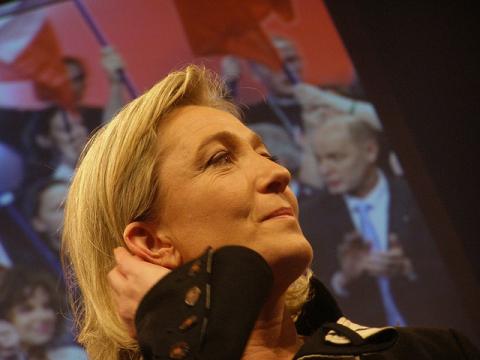France’s sombre destiny

While history tells us that Marine Le Pen would not stand a chance in the second round of the presidential elections, it has also shown that France could take a terrible turn as a result of her mere presence. By Aurelien Mondon.
Two months to the French presidential election, the prospects of the extreme right Front National remain as good as ever. In many polls, Marine Le Pen hovers at between 15 and 20% and, in some cases, even leads centre-right UMP candidate and president Nicolas Sarkozy and centre-left candidate François Hollande. Such a high score for a party founded in the 1970s by neo-fascists is a worrying prospect. While history tells us that Le Pen would not stand a chance in the second round of the election, it has also shown that France could take a terrible turn as a result of her mere presence.
To understand the way contemporary France reacts to the extreme right, it is necessary to look back on the 2002 presidential elections. When Jean-Marie Le Pen, former president of the Front National and father of Marine, reached the second round of the election, a wave of panic swept over France. The media announced the coming apocalypse and hundreds of thousands of French citizens took to the streets to show their anger, fear and hatred of the FN and its ideas. As the results of the second round demonstrated (Le Pen hardly increased his score and Jacques Chirac was re-elected with over 82% of the vote), the behaviour of the media and the French people at large was more akin to a cleansing ritual than a concerted response to a real danger. Indeed, it was clear from the beginning that the extreme right would never get a majority of the vote in 2002. In 2012, despite Marine Le Pen’s attempts at mainstreaming the FN and the help she has received from mainstream politicians and media, it remains highly unlikely that she can do better than her father.
However, this does not lessen the impact on French politics the extreme right’s accession to a second round would have in 2012. Aided by the media’s sensationalist and shallow coverage, the mainstream parties would most likely react even more strongly than they did in 2002, and turn increasingly towards more exclusivist and right-wing populist politics as the solution to their electorate’s discontent. In fact, in the lead-up to the first round of the election, set to take place in April, the UMP has already returned to populist ethno-exclusivist and neo-racist strategies, which greatly assisted in Nicolas Sarkozy’s victory in 2007 and helped keep Le Pen’s result at ‘only’ 10% of the vote.
During the 2007 campaign, Sarkozy’s understanding of politics and campaigning owed much to the rise of the Front National, notably in his overt use of populism. To appeal to the FN electorate (very successfully as it happened), Sarkozy openly and directly targeted them, using similar themes to Le Pen’s. However, the impact of his comments on mainstream politics had a reach that Le Pen could only have dreamt of: the respectability of the various positions Sarkozy held in government facilitated the legitimisation of many ideas previously considered in conflict with democratic ideals. In 2012, since many voters have decided to return to the original, Sarkozy and his colleagues will have to redouble their efforts to convince Front National voters again that ‘President Bling-Bling’ is the alternative they are looking for.
Therefore, as the election draws closer and Sarkozy remains low in the polls, his most faithful acolytes are out to chase the disillusioned and scared electorate, which has turned to the virulently nationalist and populist rhetoric of the FN. Despite a rather poor record on issues of security, there is little doubt that the government will make fear, paranoia and the division between good and evil central to the campaign. Similarly, race is bound to play a crucial role in swaying a considerable part of the electorate, which will find its real economic fears assuaged by harsh proposals to fight an imaginary yet convenient immigrant threat. Claude Guéant, Sarkozy’s Minister of the Interior, known for his recurrent neo-racist comments and his ‘obsession’ with Le Pen, recently declared that all cultures are not equal. Without naming it directly, Guéant clearly took aim at Muslim culture and civilisation, an attack Sarkozy has since described as ‘common sense’. Guéant notably criticised the wearing of the hijab and burqa as well as street prayers, marginal elements within the French Muslim community which have been turned into ‘real’ national threats through years of propaganda. In the meantime, and as a clear result of such reactionary politics, surveys have shown that anti-Muslim acts increased by 34% in 2011.
In a country that has been condemned numerous times in the past few years by various international bodies for its treatment of immigrants (be they ‘illegal’ or ‘legal’), the continual rise of the extreme right is a dire warning. With distrust of politicians at a high and gloomy economic forecasts, France, the cradle of the Enlightenment, is unlikely to see a real positive alternative arise before the election. In such a context, Marine Le Pen will most certainly perform well in the first round, and if lucky enough to reach the second round, be defeated largely by either the moderate left or right. Yet her victory will be real, in making whoever governs less moderate, less progressive and more reactionary in the years to come.
Originally published on OpenDemocracy under a Creative Commons by-nc-nd 3.0 license.
Image top: staffpresi_esj.
